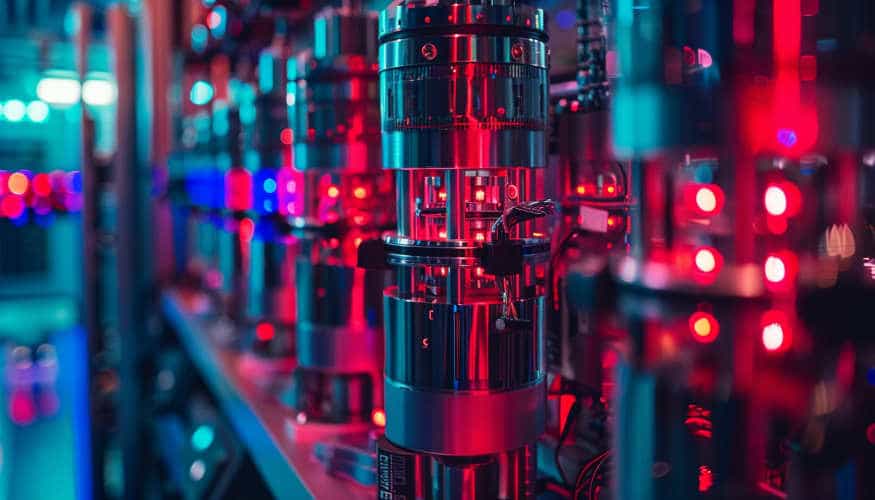Capable of solving currently intractable problems, quantum computers spark widespread imagination and curiosity. The interest from physicists, governments, and major corporations in their potential is immense. Yet as of now, these computers are not fully operational. So, what exactly is this cutting-edge technology? What challenges does it face, and what promises does it hold? Let's explore.
What is a quantum computer?
Definition
A quantum computer is essentially a super-charged classical computer.
Traditional computers process bits of information that represent either 0s or 1s, conducting calculations sequentially, one at a time.
In contrast, quantum computers operate with qubits (or quantum bits), which allow calculations to be performed at the atomic level. This is made possible by quantum physics, specifically through the superposition of quantum states, enabling quantum computers to execute multiple calculations simultaneously.
This multi-tasking capability significantly speeds up problem-solving. However, it requires a large number of qubits, and increasing these qubits results in a destabilization of the quantum states’ superposition.
Consequently, current quantum computers are still quite basic.
Good to know: While quantum computers have not unleashed their full potential yet, research into them began back in the 1980s. It was physicist Richard Feynman who applied quantum mechanics to deepen our understanding of quantum systems and their interactions, leading to the development of the earliest quantum calculators.

Quantum computers vs quantum calculators
There’s often confusion between quantum computers and quantum calculators, but they are markedly different.
A quantum calculator is designed to tackle only a single, specific problem, executing just one algorithm.
On the other hand, a quantum computer is intended to run any algorithm, solving a broad range of problems. This universal capability significantly increases the operational complexity of quantum computers.
What are the challenges faced by quantum computers?
Scaling up
The greater the number of qubits in a quantum computer, the more potent it becomes. However, it also becomes much more challenging to control.
Heat is a particular issue. Quantum computers must operate in environments with extremely low temperatures (just above absolute zero) for optimal functionality. The catch is, each qubit computation generates heat. As the number of qubits increases, so do temperatures, compromising the qubits’ functionality.
Today, existing quantum computers boast only about a dozen or so qubits, with more advanced machines reaching around a hundred. Yet, devising complex algorithms would require thousands of qubits.
Decoherence
Another significant hurdle is decoherence, meaning the quantum computer’s interaction with its environment.
Imagine a house of cards. The more cards added, the more susceptible it becomes to the slightest changes in its surroundings (like a gentle breath).
A similar scenario applies to quantum computers. Even the smallest environmental anomaly can lead to errors. Experts have estimated that an error occurs in every 1000 operations.
Thus, shielding them from environmental interference is crucial. Proposed solutions include:
- Solid-state circuits: such as superconductors or quantum dots, which facilitate operating a large number of qubits. However, they’re highly sensitive to environmental conditions, thus prone to decoherence.
- Trapped ions: which are more resilient to environmental disruptions. Integrating these systems into a computer chip, however, presents a formidable challenge.
- Quantum codes: error-correcting codes still under development but essential for the functionality of quantum computers.
What is a quantum computer for?
$35.5 billion was invested worldwide in quantum technologies in 2022, with France also making significant investments of 1.8 billion euros. What’s behind this enthusiasm? The vast potential of quantum computers.

What are the promises of quantum computers?
Thanks to their ability to conduct multiple calculations simultaneously, quantum computers can process vast amounts of data much more efficiently than today’s computers, especially in the era of big data.
They could effectively utilize Shor’s algorithm, the most potent known algorithm, which can factorize large integers much faster than current capabilities allow.
Google has even suggested that a quantum-technology-based processor could complete certain operations in just 3 minutes, a task that would take a classical computer 10,000 years to solve.
What practical applications does this offer? Here are some examples:
- Enhancing encryption methods in cryptography (Shor’s algorithm could potentially crack RSA-type encryption);
- Modeling chemical molecules for new drug development;
- Creating complex financial systems;
- Producing room-temperature superconducting materials for lossless electrical transmission;
- Refining AI and machine learning models;
- and more.
Quantum computers promise to revolutionize a vast array of sectors, from finance and industry to healthcare, particularly as they complement other quantum-based technologies like quantum communication and sensors.
Will quantum computers see the light of day?
At present, there’s no consensus among scientists about when quantum computers will become a reality. However, given the substantial investment in developing this technology, it seems likely they will eventually materialize, whether in 3 years, 10 years, or 20 years.
Whenever they do become operational, if quantum computers deliver on their promises, they will undoubtedly herald another major technological revolution, akin to the internet or the recent advances in artificial intelligence.










